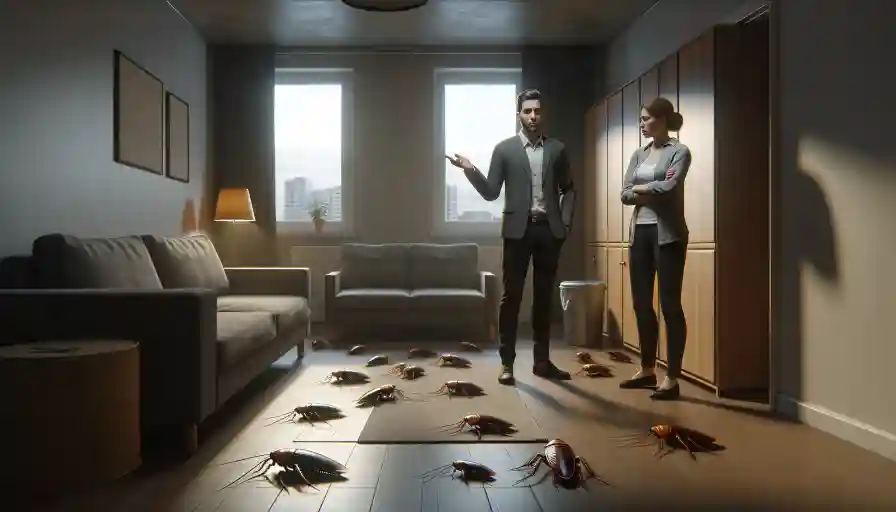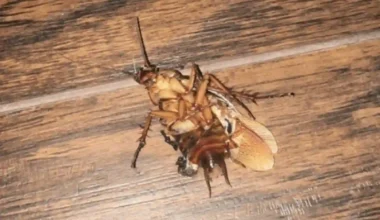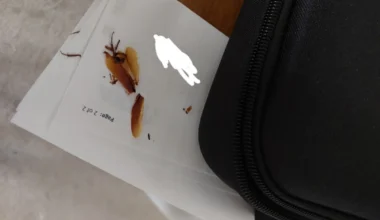You just signed a year lease and a few months later, you find roaches everywhere in your home. If your landlord did not disclose roaches in the apartment, that’s absolutely normal. Landlords are not required to disclose prior infestations when renting a dwelling. However, it is their responsibility to provide you with a roach-free home.
Cockroaches in your new apartment can be really frustrating. So, if you are dealing with this problem, you might be wondering what to do next and if your landlord failed to disclose the roaches before you moved in.
In this guide, we’re going to clear up all your questions about cockroach infestations and who’s responsible for exterminating them. We’ll explain what counts as an infestation and whether landlords are supposed to make sure their properties are roach-free.
Landlord Did Not Disclose Roaches

Landlords don’t have to inform tenants about pest infestations, but they must ensure the property is clean and habitable. Depending on where you live and your rental agreement, getting rid of cockroaches could be either your job or the landlord’s. If you spot an infestation, let your landlord know right away and record everything with photos and notes.
Landlords have absolutely no obligation to disclose prior roach infestations. However, the landlord must provide you with an apartment that is clean, sanitary, and free from all accumulations of debris, filth, rubbish, garbage, rodents, and vermin at the start of the tenancy.
Do Landlords Have to Disclose Roaches?

Landlords don’t have to disclose to you about cockroach problems in your apartment. However, they have a responsibility to make sure that your apartment is habitable.
If cockroaches appear while you occupy the apartment, you might be responsible for the infestations. So, make sure that you are meeting the apartment with the infestation and that you are not responsible for it. Typically, make sure to clean dishes and take out trash to discourage cockroaches.
When Is It Considered an Infestation?
If you see just a couple of roaches, usually it doesn’t mean there’s an infestation. Pest experts usually rate infestations as light, moderate, or heavy. A light infestation means finding up to five cockroaches. A moderate infestation is about 10 to 25 cockroaches. Over 25 cockroaches are considered a heavy infestation.
Signs of Roaches to Look For
A big sign of an infestation is seeing cockroaches in the daytime. Since they’re usually active at night, daytime sightings can suggest a bigger problem.
Other signs include a strong, musty smell, and finding roach eggs and droppings. These droppings can look like black pepper or coffee grounds and are easy to mistake for crumbs.
So, make sure to inspect floors, kitchen drawers, and countertops for these droppings. Even if you see just a few roaches, these signs mean you should act. There could be many more roaches hiding.
Who is Responsible for Roaches Landlord or Tenant?

A landlord is responsible for roaches if the landlord did not disclose roaches before you moved into the apartment. However, a tenant is responsible for roach extermination if an infestation breaks out after their stay. Note that it’s possible to bring in roaches while moving into your new apartment.
Generally, landlords must make sure the place you’re renting is clean and doesn’t have any dirt, trash, or pests like roaches or rats when you start your lease.
Usually, if cockroaches appear while you’re living there, it’s up to the landlord to handle extermination. You should notify your landlord about any roach issues as soon as you notice them. Then, you can ask them to deal with it quickly.
Sometimes, the roach extermination responsibility depends on what your lease says. Most of the time, the lease makes the landlord responsible for pest control. However, sometimes the lease might say it’s the tenant’s responsibility.
Landlords need to make sure there are no pests when you move in. After that, the lease might say you have to pay for regular pest control. In this case, the landlord doesn’t have to manage general pest control.
If you’re supposed to handle pest control and you don’t, you might face consequences. You would usually have to cover all costs related to getting rid of roach infestations.
How to Tell Landlord About Roaches

So, if the landlord does not disclose roaches, you can always tell them about the roaches. Depending on the lease and who is responsible, you can tell your landlord about the roaches by following these steps:
Document the Roach Problem
Before reaching out to your landlord, gather evidence of the roach infestation. Take photos or videos of the roaches and note the locations and times when they are most active.
Write a Formal Letter or Email to Your Landlord
Compose a letter or email to your landlord. Start by clearly stating the purpose of your message – reporting a roach infestation. Be specific about the roaches you have observed, including the extent and possible locations of the infestation. If you have taken any steps to control the problem, such as using roach traps or maintaining cleanliness, mention these in your communication to show that you are proactive and responsible.
Request Immediate Action
Politely ask your landlord to address the issue as soon as possible. You might suggest professional pest control services if the situation seems severe. Make sure to highlight that roaches can pose health risks, such as allergies and asthma, especially if there are children, elderly, or people with health issues living on the property.
Refer to Your Lease Terms
If your lease includes clauses about pest control or maintaining a habitable environment, refer to these. This can remind the landlord of their legal obligations.
You can always offer to cooperate with any pest control measures, which may include allowing access to your unit for inspection and treatment.
Keep Records of Communications with Your Landlord
Save a copy of your communication and any responses from your landlord. This can be useful if the issue escalates and you need to prove that you reported the problem. If you don’t hear back from your landlord within a reasonable time, send a follow-up message. Persistent but polite communication is key.
Know Your Tenant Rights
Familiarize yourself with tenant rights in your area regarding pest infestations. If your landlord is unresponsive, you may need to seek advice from a tenant’s association or legal counsel.
What if Your Landlord Ignores a Roach Problem?

If a landlord neglects a roach problem in your apartment, you may be eligible for compensation. However, they typically can’t end their lease unless the infestation poses a significant health risk.
You can also withhold rent but this requires substantial proof. This proof must demonstrate both the issue’s existence and your notification to the landlord.
Merely finding proof of infestation isn’t sufficient for legal protection if the landlord sues for rent nonpayment. In court, you need admissible evidence like photos and written notices about the infestation.
Consult Your Local Lawyer if Landlord Won’t Take Action
If your landlord doesn’t address the roach infestation after failing to disclose it in the first place, consider consulting a lawyer. They can clarify your legal options based on various factors. These factors might include your tenancy duration, the infestation’s severity, and how long the landlord has known about and ignored the problem.
Laws on handling cockroach infestations differ by state. In some places, you can leave your rental immediately. In others, you might need to pay for extermination or arrange temporary housing during the process.
Sometimes, the cost of extermination may be subtracted from your next rent payment. However, not following your lease terms or local laws could land you in trouble. Regardless of who is responsible, whether it’s you or your landlord, remember to document the situation with photos and notes to protect you if legal issues arise.





